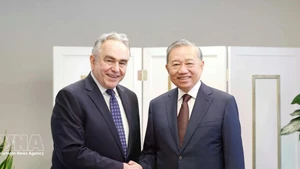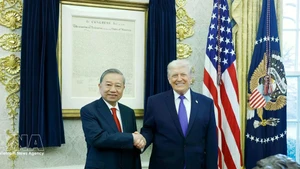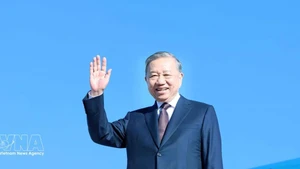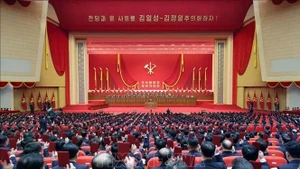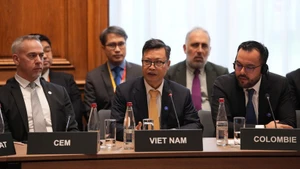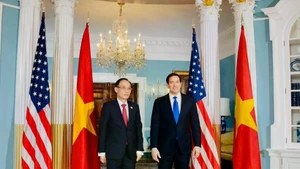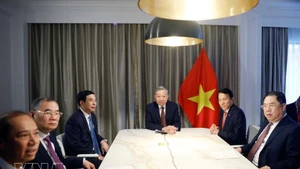They were the first activities within the framework of the 40th and 41st ASEAN Summits and related summits.
During ASEAN leaders’ Interface with AIPA representatives, representatives from AIPA member legislatures highlighted parliamentary diplomacy’s contributions to common efforts to seek solutions to regional issues. AIPA representatives proposed four groups of recommendations to ASEAN leaders related to harmonious people-centred socio-economic development, promotion of green, equitable and sustainable investment, improvement of capacity to respond to and mitigate damage caused by natural disasters, and strengthening of regional parliamentary cooperation.
Leaders of ASEAN member states acknowledged the important contribution of AIPA over the past decades to the process of building the ASEAN Community. They affirmed AIPA plays an important role in upholding principles, standards, code of conduct, promoting dialogues and responsible participation of partners for peace, security and prosperity in the region.
They proposed measures to improve the efficiency of coordination between legislative and executive channels, including actively reviewing and removing barriers, striving to harmonise laws and facilitate the implementation of agreements and cooperation programmes, especially in fields of concern such as digital transformation, energy transition and climate change response.
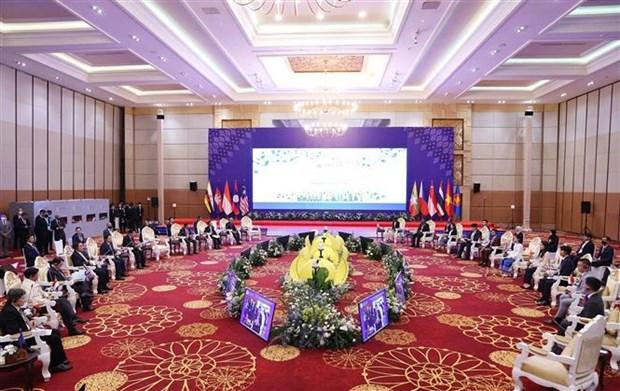 |
| At the Interface with representatives of the ASEAN Youth Organisation. (Photo: VNA) |
Meeting ASEAN leaders, representatives of ASEAN Youth Organisation expressed young generations' wish to join hands to contribute to the common recovery and development of the region with a willingness to learn in order to be best prepared for the future. They highlighted a need to ensure inclusive and across-the-board educational programmes targeting all young people, especially those in remote and mountainous areas while giving equal attention to all fields to fully equip youth with necessary skills in the 21st century.
Suggestions submitted to ASEAN leaders included optimising scientific and technological advances to facilitate exchanges and connectivity, expanding exchanges for youths, young teachers, researchers and scholars to narrow the gap between urban and rural areas, paying more attention to children's mental health following COVID-19 epidemic, and strengthening the standardisation of qualifications to promote labour movement and create more job opportunities for young people in all member countries.
The ASEAN Leaders affirmed that young people play an important role in stepping up cohesion and responding to common challenges in the region, contributing to planning the future of the ASEAN Community. They spoke highly of youths’ practical suggestions to solve regional issues, saying that they demonstrate the awareness and responsibility of the young generation for ASEAN’s important decisions.
Meanwhile, ABAC delegates said ASEAN need to continue asserting its leading role in strengthening an open, responsible, fair and rules-based multilateral trading system. They suggested that member countries consider building the ASEAN Economic Community a national priority, improve economic self-reliance through economic harmonisation and integration; and on that basis, promote trade facilitation, digital transformation, smart connectivity, circular economy, energy transition, building responsible and inclusive businesses, food security and tourism.
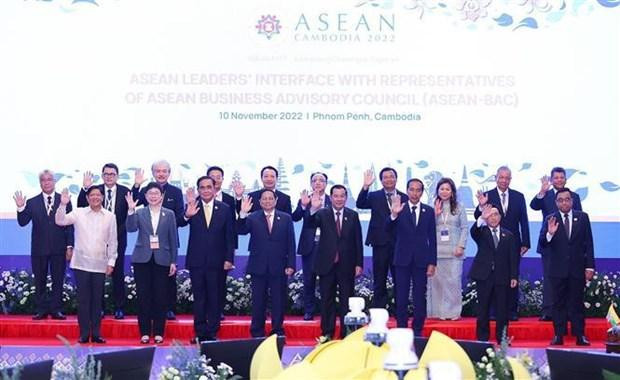 |
| At the Interface with representatives of ABAC. (Photo: VNA) |
Addressing the Interface with representatives of ABAC, PM Chinh said Vietnam’s GDP grew by 8.83% in the first nine months of this year, with the business community contributing over 60% of the national GDP.
The Vietnamese Government always pays attention to institutional reform, improving business environment; supporting businesses, especially micro, small and medium-sized enterprises, and creating favourable conditions for all economic sectors to prosper, particularly private sector, he said.
To further facilitate businesses’ involvement in the process of building the ASEAN Community, he suggested strengthening dialogues and cooperation so that policies are planned in line with strategic orientations of countries and aspirations of the business community for real benefit of the people.
Apart from controlling COVID-19, he proposed ASEAN governments continue with synchronous measures to maintain macro-economic stability, control inflation, promote growth, ensure major balances of the economy, promptly respond to the risk of recession and crisis from the outside, harmoniously handle international economic cooperation and competition, and step up trade. In his opinion, firms need to actively embrace sci-tech and digital transformation, ensure workers’ rights in combination with manpower development, thus meeting increasing demand of the labour market and better perform social responsibility.
The Vietnamese government leader expressed his belief that with ASEAN leaders’ commitments, ASEAN BAC and ASEAN business community will have many initiatives and take specific, practical and effective actions to overcome challenges, firmly consolidate the relationship between the State, enterprises and people, for a resilient, strong, sustainable and inclusive bloc.
The 40th and 41st ASEAN Summits are scheduled to open on November 11 morning. Leaders of ASEAN countries will attend the plenary and retreat sessions to discuss the ASEAN Community building process, ASEAN's external relations as well as regional and global issues of shared concern.
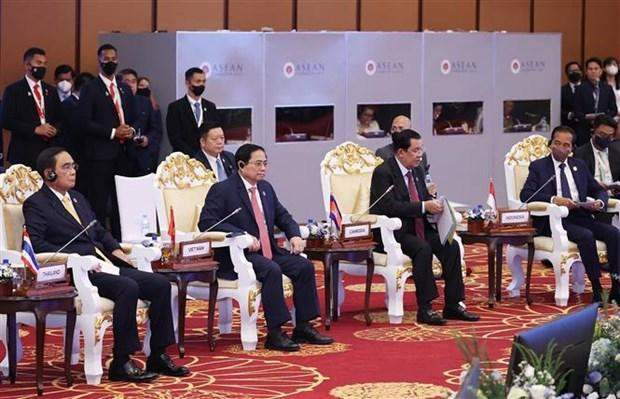
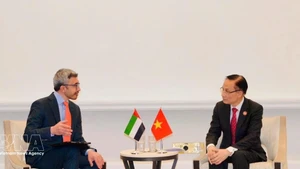
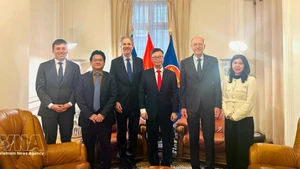
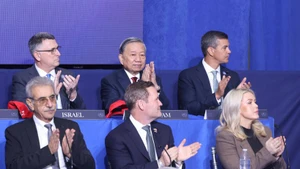
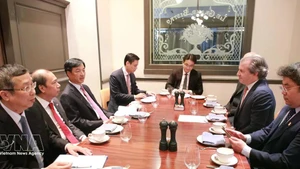
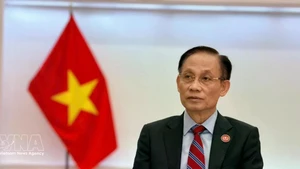
![[In pictures] Party General Secretary To Lam meets US President Donald Trump](https://en-cdn.nhandan.vn/images/dcd63867a0eed4c7753eb4bfb346593abc1ce710dfab8ad1b9aebd75ea6bf930b2ea13e4664779d689ba40aadd80f76d5d05d1208720fd7b0d811ace3a3297321c78cf738400e136e3f2d8790b24d43646e46edbe19517144a88f6ffb0d528f153574a7109328cc0949e4a4c16433c2ff751541639eefe4490518227264cbf8e/vna-potal-tong-bi-thu-to-lam-gap-tong-thong-hoa-ky-donald-trump-8599945.jpg.webp)
